Bookshelves
I'd recommend getting Reddit Enhancement Suite for your browser before you look at this, but some good ones on there.
I came along from Goodreads to keep reading some reviewers I enjoy. Thought I'd register and see what the site is like.
I'd recommend getting Reddit Enhancement Suite for your browser before you look at this, but some good ones on there.
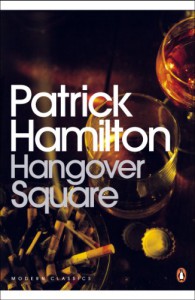
I was skimming through the books I have read so far this year and saw that I’d been a little harsh with my rating for this one. I think perhaps because it’s quite a dark, depressing tale. When comparing it to most of the gubbins I’ve read in 2013, it certainly ranks highly. So I’ve amended my rating.
Hangover Square follows the pathetic George Bone and a contemptible collection of his fellow alcoholics around Earls Court in late 1930’s London. Within this group is Netta, with whom George becomes obsessed. What becomes clear early on is that Netta is a detestable human being who, along with her accomplice Peter, is quite happy to string people along to get what she wants.
And that, I suppose, is the main thread of the book. A cycle of the same things happening again and again due to a man who is trapped by both drink and his unrequited obsession with a woman. George seems to be the only character with a slim chance of escaping to a better life, particularly as the novel reaches its conclusion. But there is Netta, always dragging him back.
This isn’t an easy read by any means, but within that grimness there is humour and Hamilton creates a vivid picture of Britain (London particularly) on the brink of war. What most interested me about his writing was quite how contemporary it felt. Of course the 1930s weren’t Victorian England, but there seemed to be something quite open about the book, particularly the subjects examined. I enjoyed this ‘street-level’ view of things, where subjects aren’t skirted around due to manners.
Without offering any plot spoilers, I’m not sure the story required the split personality idea – in my opinion it would have played out just as similarly without – but overall a very dark (but enjoyable) read that is worth the effort.
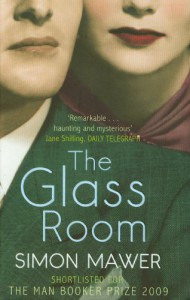
Reader! Do you want a badly written romance novel with GCSE level attempts at symbolism and ‘depth’? Look no further. Not that this is how The Glass Room is described. If it was I wouldn’t have gone near it. This, after all, is a book shortlisted for The Booker Prize.
“Life is like that”, he said, his gaze caught by the glow of the light reflecting against the Onyx wall as evening fell. “Modern is the future”. And then they had sex on the linoleum.
Or something like that.
What we have is a book which focuses on a fictional version of Villa Turgendhat and mentions over and over that it has a glass room with an Onyx wall. Apparently the light and space can be used to symbolise anything you want and loads of people have sex in it. With the subtlety of a brick, this symbolism or reference to the title of the novel is hammered into your brain time and time again.
Seemingly all Mawer has done is lifted the history of the building and then slightly modified the lives of the owners, throwing in some fictional supporting characters and adding a tawdry bit of sex every few pages to fill the book out. Every woman had lesbian tendencies during the period covered, don’t you know. And if someone has had an affair, you can bet good money that their lover is going to show up at the house at an awkward moment - but the besmirched party will carry on with a stiff upper lip, mainly because they have dark desires of their own. Of the sapphic kind. Yawn.
And don’t worry, just when you are about to chuck the book in the fire, the plot fast-forwards with a whole new set of characters and things repeat themselves all over again. I think he is trying to show how the building is witness to the same follies through various generations, but it was a bit too complex for me to grasp. I got a C in English Literature, you see.
Mawer’s attempts to add a bit of historical perspective to proceedings were clumsy too. Oh look, there’s Hitler driving past. Hi Heydrich! I was half expecting a scene where a neighbour mowing their lawn turns out to be Stalin.
And then we get onto language. In many places the use of Czech or German are unnecessary. It’s nice that the author wanted to engross themselves in the period so thoroughly, but spare us, please. Curak.
As a final insult, after dragging yourself through 404 pages, there is an afterword explaining that the German name of the space is far more poetic and symbolic than the English title of the book. So all that heavy handed bollocks I suffered throughout the story was all lost in translation, obviously. Silly me, I just thought I was reading an awful book.
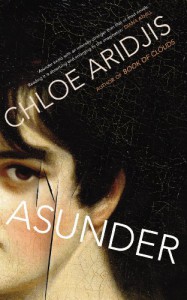
This is one of those books where I’m not sure if I’m being incredibly harsh with my rating, or whether it really is a case of style over substance. It just didn’t manage to fully grab me as I read it, my interest kept drifting in and out But then again at the same time I find myself still thinking about it now and wondering whether or not I’ve been unfair with my judgement.
There is no doubt that Asunder is a beautifully written book. Some of the description and imagery conjured up is seriously impressive. Lyrical in it’s style, yet in places powerful, I can recommend it highly for this alone.
A number of proper reviews have called this book ‘subtle.’ That’s usually a pointer towards ‘not a lot happens and it’s all overly pretentious’. And to a point that’d be right. The scenes with Marie’s artwork fit into this bracket and left me cold (and bored). Also, to some degree, the lengthier description of Daniel’s poetry. But then please do bear in mind that I am an insensitive brute.
But at the same time as I was growing frustrated with these parts of the story, the enjoyment came from watching the slow shift in Marie’s relationships with other people and the tensions that arose as she attempted to keep everything in its order. From her flatmates - current and former - occupying her dingy London accommodation (wonderfully described) to her fellow guard friend Daniel and his various associates, to the paintings she guards by day, I was just waiting for something in her to crack. The craquelure of life, baby. These are the points where the book excels.
Marie is clearly a worldly woman in her own way. Why then does she live the life of a semi-recluse? Will she manage improve her lot by the end of the book?
Coming in at 190 pages, there is no doubt that Chloe Aridjis has got some serious skill. The whole thing is concise with not a word wasted. For such a short novel it gives the feeling of the slow inexorable drudgery of life. And there, perhaps is why I can’t mark it higher. I’ve got enough drudgery in my own world.

I had heard, God knows where, that The Magicians was a good modern fantasy story. If I ever find out who it was that told me this, they will be spending a long time apologising to me. Thinking about it now, some time after I finished reading it, it actually ranks close to A Week In December on my all time list of most hated books.
The book follows Quentin Coldwater (I know), a miserable teenager who seems to spend the entire book moping and not really liking anything or anyone at all. Not bad in itself, I live most of my life that way, but in a book with horrible writing, a dull plot and paper-thin characters, the protagonist needs to have a bit of something about him. The whole thing is just beneath beige.
Harry Potter for adults, they said, but I presume what Grossman tries to illustrate to us during the magic college sections of the book is magical realism – endless study for little reward and that those who can perform magic aren’t so different from anybody else and can have equally mundane existences. I say this because it can be the only explanation for the crushing tedium that this book inspires.
The writing is bad. There appear to be unexplained parts all over the gaff. Perhaps these are explained in later books, but I refuse to read them. The characterisation is appalling. Ignoring Quentin’s complete lack of a character arc, none of the supporting characters are fleshed out in any great detail. Their actions and motivations make no sense when compared with what Grossman has written about them.
And then there’s the Arctic Fox sex scene. At the point the book got bounced off the wall. As well as being ridiculous in every sense, there was something a bit rapey about the whole thing. Bad sex in fiction award at least.
I really don’t want to waste my time writing any more about this book, but Fillory = Narnia, and not even with any subtlety. It’s as close to plagiarism as I’ve seen. There’s also some sort of game all the magic schools play too, but the lengthy description of it was so boring I just decided to call it Quidditch.
I have a feeling that since re-decorating their house, my parents have thrown out my future inheritance.

I am not best pleased.
Just seen this today. Looks like it could be decent. Although I always had Norrell down as much older.
I'd prefer a new book though.
I've also noticed that 130 episodes of the BBC World Service's book club are available to download. And A Good Read is back on Radio 4. Be still my heaving smartphone.
Other than that I'm trying to think of a book I read recently that I can slag off while I try to finish my current reads. Writing a positive review is never as much fun.
Edit - Also my mate got published in Litro on Sunday. Classic author-like photo at the bottom. Loving the pensive finger. http://www.litro.co.uk/2013/10/october-storms/
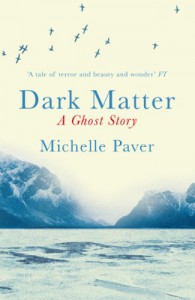
Dark Matter had been sitting on my shelf for a while before I picked it up. I’m not sure why I left it so long. I’d heard it was good and as a fan of anything reminiscent of The Heroic Age of Antarctic Exploration I knew I would enjoy it. And it says it’s a ghost story on the front cover. What’s not to like?
The story, in case you don’t know, follows Jack as he is selected to join a scientific expedition to Spitsbergen (that’s Svalbard, His Dark Materials fans). The book takes the form of his journal, written prior to and during events on the island.
I will admit, I didn’t particularly enjoy the opening part of the book. The issues of class and Jack’s resentment toward the other members of the expedition felt a little cack-handed, but once they all set sail the story came to life.
Paver’s descriptions of the Arctic - from the majestic empty landscapes and grubby sealing towns to the grimly stoic Norwegian sailors – really set the scene. She’s obviously done her research – the setting where the main bulk of the story takes place, the fictional Gruhuken, is wonderfully described and I can still picture all of it perfectly.
The character of Jack also develops nicely. Initially we are presented with a man in love with the desolation of Spitsbergen who ignores his reservations in a way, we come to see, his companions do not, mainly in order to impress them. Later as permanent darkness comes and people go, we begin to see a truer picture of Jack, alone with just his thoughts, his daily routine and the dogs for company.
What I really loved was the ghost element. As endless night arrives, the reader is left to make their own mind up – are we witnessing cabin fever mixed with a healthy dose of sailor superstition (or perhaps a mental breakdown), or is there something truly supernatural and evil going on?
Many ghost stories fail to do anything for me but the suspense and building feeling of dread was excellently done here. While reading one key passage an old lady coughed next to me at the bus stop and I jumped quite unexpectedly. Luckily nobody noticed though, because I styled my way out of it by pretending to fidget a bit.

You know when someone you don't know very well regales you with tales of when they went 'travelling'? And rather than recognising them as some funny holiday stories, they treat their 'experience' as a higher calling that completely altered their outlook on life? And you know how all this is usually when you're trying to squeeze out of the kitchen at a below average house party?
Well, that.
Except this time it's not a recently graduated student who's just had a house bought for them in south London, it's a middle aged Italian woman.
The Other Language isn't terrible in the slightest. It's not her, it's me. The short stories are well written and often begin quite intriguingly. I just don't think that I'm its target audience.
Roman female has strained relationship with siblings/partner, event occurs that seems small but leads to seismic change. Often away from home. Repeat x 9.
Maybe it's all too subtle for me. I'm not the biggest fan of short stories anyway, but while I like the writing, I just can't warm to the stories at all. Nothing of any interest grabs me. I've got other things I want to be reading.
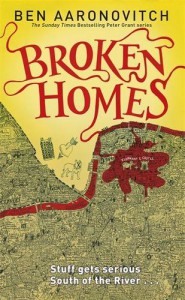
Ben Aaronovitch’s series of books following new police recruit Peter Grant seem to have attracted a good sized fan base already, but now that I’ve reached the end of book number four, I’m not sure why.
“Rivers of London is what would happen if Harry Potter grew up and joined the fuzz”, reads one review/tagline on the blurb. Yeah, if Harry Potter had a crippling form of OCD that meant he needed to describe everything he saw in minute detail to all and sundry.
I don’t think it’s unreasonable of me to say that Ben Aaronovitch is not the greatest writer in the world. I mean, he’s not Lev Grossman or Ransom Riggs levels of bad, but he’s pretty bad. From the first book (Rivers of London) onwards, description dominates. Not just a quick bit on how police procedure works or an aspect of London that people may find interesting – we’re talking minutiae here. To beyond the point of tedium. The worst of CSI meets the worst walking tour of London ever devised.
With Rivers of London and Moon Over Soho (book 2) however, this was forgiveable because the books did produce some great ideas and rattled along at a fair old lick. I enjoyed seeing how magic worked within the context of the book, and it’s a believable system that fits in nicely with the modern setting. The characters were also fun, a good mix that - as far as a book featuring magic allows - were believable and suited their roles. Even the plots were intriguing, working well with the main theme and areas of London used for that specific book in the series.
But all that is gone now. The characters remain but have failed to develop since they were first introduced – now predictable and boring. This last book is filler for the next one – feeling like a TV script setting up for series 2. There is nothing I hate more than a glorified screenplay or a stop-gap/’to be continued’ book (Chaos Walking, I’m looking at you). Some people might not mind, but it gets right on my wick.
No longer do we have interesting and quirky elements of London folklore in a self contained tale, we now have an ongoing nemesis and the fight against him across each book. Of course the overarching plot has to develop, I can appreciate that, but it seems to be at the expense of one of the things that make the series interesting. And please, An arch enemy called 'The Faceless Man' and an incident with [character in book 1], and them having gone all strange. What might happen there then...?
When you lose the elements that you liked, you really start to notice the things that annoyed you originally. I tolerated book 3 (Whispers Underground) in the hope that this one might come good, but I think that's it for me now. Fascinating details of the intricacies of the HOLMES system are to be enjoyed by hardier souls than I.
Fans of the Dresden Files have had a few words to say about the similarity with Aaronovitch’s books for a while now, and while I haven’t read any Jim Butcher to be in a position to comment, I can tell you that Christopher Fowler’s Bryant and May series knock these out of the park when it comes to quirky tales set around London folklore. Each one a separate theme, great characters that develop, and an interwoven continuous story. No magic though, but plenty of occult and mystery.
And not so much bloody description.
I like the look of the site. Hopefully, if they can add a few more options, it will be a lot more intuitive and less bloated than Goodreads.
You may be able to do these things, and it's likely me being thick, but a way to quickly change editions of books would be good - importing my .csv file over has pulled up a number of missing and wrong covers and I'd rather not have to spend my Sunday deleting the books and then adding them from scratch.
Also, the blog looks good. A much smarter way of doing things and means you don't just have to write reviews, which hopefully could lead to some more interesting people to follow.
*****
Edit 13/10/13 - editing titles, mainly covers, is not fun. It's a lot easier in blog posts than I thought it might be, but shelves are a pain. Particularly if, like me, you are terrible at metadata or if seeing an image of a sticker on the cover image causes you to have a near meltdown. Not to mention the book cover you read not being available (in fairness it took Goodreads years to offer this - my shelves were full of American covers for ages).

“One should never mix Dan Brown with Paul Michael, thought Robert Langdon as he sat in the wing backed leather chair wearing his [insert entire wardrobe in explicit detail here].”
I listened to the audiobook version. It was not my choice. Torture if you ask me. What a grim way to drive through the French countryside; a story so dull everybody in the car fell asleep, including the driver (I’m not even joking).
Let me start by saying that I didn’t mind The Da Vinci Code and Angels and Demons when I was younger. Yes they were silly, but they rattled along and were fine for the airport.
How times change.
I’ve never been to Florence. I don’t know much about it either. But what I don’t want is a book that is basically a rubbish guided tour where the guide is so inept that they miss out all of the crucial parts that you want to know and go into overwhelming detail that no one gives a toss about instead. In a fiction book this is filler of the worst kind.
The dialogue is awful, the story beyond bad. It makes Tromeo and Juliet look like a masterpiece. And don’t get me started on the characters. A child prodigy and genius who doesn’t even know what a death mask is? We learnt about the plague in year 5, cretin.
And as the pseudo profound statements (“one should never mix Bombay Sapphire with Gogol"), do you think Brown’s editor feels dirty as they wade through this mountain of crap?
On top of this with Michael reading you get double-teamed. There is no suspense, no excitement, nothing. He is monotone and devoid of any personality. The only bit the car enjoyed was his atrocious attempt to do an English accent. Apples and pears, guvnor.
I have nothing to recommend and I could go on being negative. But I wasted 17 hours of my life listening to this and to spend any more time reflecting on it would be criminal.
Just don't bother.

French? Check. Ancien régime? Check. Crime? Check. A pretty perfect holiday read for me then, or so I thought.
While I can’t claim to know much about the period, I've enjoyed other books set around the era (Pure, The Count of Monte Cristo) and fancied returning to it.
The opening scene had me excited. Tense and evocative, I looked forward to getting to the bottom what seemed to be an interesting mystery.
But sadly it wasn’t long before the blemishes began to show.
Whether due to poor translation, a French style that doesn’t quite work with my English sensibilities, or the author’s flaws, the book is stodgy. Reams of description bog down the story, as does unnecessary historical and culinary detail. A skilful skim reader will only need to read one paragraph every 3rd page.
Moments of suspense or excitement are poorly structured and rushed in the extreme. The resolutions of the culprits are two significant examples, but the book is littered with them. The epilogue is as obvious as it is tacked on with a staple gun.
The characters are enjoyable stereotypes in the main but Nicholas Le Floch is nigh on unbearable. Such perfection! Even when he knows people should hate him, he does nothing to rectify the situation - they are all to busy swooning beneath the glow of his unrelenting magnificence. Weaknesses? None.
This is all before you consider the book's merits as a mystery story. No subtly left clues here. No build up of suspicion. It's all so heavy handed and seems a second thought to Parot, leaving you feeling cheated.
I picked this up having seen a later volume in the series nominated for a CWA award. Sadly, as I have discovered on a few occasions, this endorsement isn’t always the indicator of quality that it should be.
This is the first Nicholas Le Floch book in the series and it will be my last. Au revoir, Monsieur Parfait.

A book that gets progressively worse the more you read. Poor characters, plot and dialogue. I found Jacob thoroughly unlikeable and the characters paper thin, and while the language may be 'young adult', the writing was infantile.
While the story was poor, the unforgivable sin in my eyes is a book that clearly isn't going to finish in any satisfactory manner until about book 3. Series are fine, but please have a bit of skill and create an enjoyable yarn within each book.
I'm afraid I won't be reading any more of these.